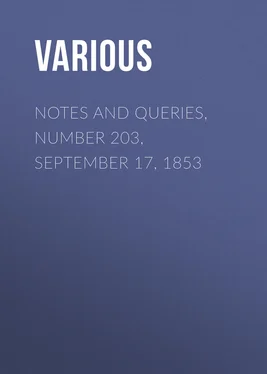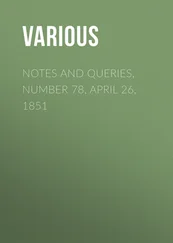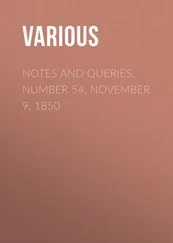Various - Notes and Queries, Number 203, September 17, 1853
Здесь есть возможность читать онлайн «Various - Notes and Queries, Number 203, September 17, 1853» — ознакомительный отрывок электронной книги совершенно бесплатно, а после прочтения отрывка купить полную версию. В некоторых случаях можно слушать аудио, скачать через торрент в формате fb2 и присутствует краткое содержание. Жанр: foreign_antique, periodic, foreign_edu, на английском языке. Описание произведения, (предисловие) а так же отзывы посетителей доступны на портале библиотеки ЛибКат.
- Название:Notes and Queries, Number 203, September 17, 1853
- Автор:
- Жанр:
- Год:неизвестен
- ISBN:нет данных
- Рейтинг книги:3 / 5. Голосов: 1
-
Избранное:Добавить в избранное
- Отзывы:
-
Ваша оценка:
- 60
- 1
- 2
- 3
- 4
- 5
Notes and Queries, Number 203, September 17, 1853: краткое содержание, описание и аннотация
Предлагаем к чтению аннотацию, описание, краткое содержание или предисловие (зависит от того, что написал сам автор книги «Notes and Queries, Number 203, September 17, 1853»). Если вы не нашли необходимую информацию о книге — напишите в комментариях, мы постараемся отыскать её.
Notes and Queries, Number 203, September 17, 1853 — читать онлайн ознакомительный отрывок
Ниже представлен текст книги, разбитый по страницам. Система сохранения места последней прочитанной страницы, позволяет с удобством читать онлайн бесплатно книгу «Notes and Queries, Number 203, September 17, 1853», без необходимости каждый раз заново искать на чём Вы остановились. Поставьте закладку, и сможете в любой момент перейти на страницу, на которой закончили чтение.
Интервал:
Закладка:
Various
Notes and Queries, Number 203, September 17, 1853 / A Medium of Inter-communication for Literary Men, Artists, Antiquaries, Genealogists, etc
OUR SHAKSPEARIAN CORRESPONDENCE
We have received from a valued and kind correspondent (not one of those emphatically good-natured friends so wittily described by Sheridan) the following temperate remonstrance against the tone which has distinguished several of our recent articles on Shakspeare:—
Shakspeare Suggestions (Vol. viii., pp. 124. 169.).—
"Most busy, when least I do."
I am grateful to A. E. B. for referring me to the article on "Shakspeare Criticism" in the last number of Blackwood's Magazine . It is a very able paper, and worthy of general attention.
I ought to add some few explanatory observations upon the subject of my former communication, but the tone of A. E. B.'s comments forbids me to proceed with the discussion; the more especially as my suggestion has been made a reason for introducing into your pages comments which seem to me to be altogether unwarrantable upon other portions of the article in Blackwood. Whoever may be the writer of that article—I do not know—he needs no other defence than a reference to his paper. It is not on his account that I venture to allude to this subject; it is rather on yours, Mr. Editor, and with a view to the welfare of your paper. I cannot think that you or it will be benefited by converting conversational gossip about Shakspeare difficulties into "a duel in the form of a debate," seasoned with sarcasm, insinuation, and satiric point. This is not the kind of matter one expects to find in "N. & Q." neither do I think your pages should be made a vehicle for "showing up" such of "the herd of menstrual Aristarchi" as chance to differ in opinion from some of your smart and peremptory, but not unfrequently inaccurate and illiberal correspondents.
I know that you yourself are in this respect much in the power of your contributors. Probably you were as ignorant of the existence of the article in Blackwood as I was. 1 1 We had not seen this very able article until our attention was called to it by this letter. We regret that the author of it was not aware of what had been written in "N. & Q." on many of the points discussed by him. Such knowledge might have modified some of his views.
It is now brought before your notice, and I invite you to look at it, and judge for yourself whether A. E. B. has treated you, your paper, or the writer of that very excellent article, with common fairness in the remarks to which I allude.
I make these observations on two grounds: first, as one who has many reasons for being anxious for the prosperity of "N. & Q.;" and secondly, because I know it to be the opinion of several of your earliest and warmest friends, that there is a tendency in some of your Shakspeare contributors to indulge in insinuation, imputation of motives, and many other things which ought never to appear in your pages. We lately observed, with deep regret, that you were misled (not by A. E. B.) into the insertion of unjustifiable insinuations, levelled against a gentleman whom we all know to be a man of the highest personal honour.
The questions which are mooted in your pages ought to be discussed with the mutual forbearance and enlarged liberality which are predominant in the general society of our metropolis; not with the keen and angry partizanship which distinguishes the petty squabbles of a country town.
Icon.Our readers know that we ourselves recently noticed the tendency of too many of our correspondents to depart from the courteous spirit by which the earlier communications to this Journal were distinguished. The intention we then announced of playing the tyrant in future, and exercising with greater freedom our "editorial privilege of omission," we now repeat yet more emphatically. Icon well remarks that we are much in the power of our contributors. Indeed we are more so than even he supposes.
An article on the Notes and Emendations which lately appeared in our columns concluded, in its original form, with an argument against their genuineness, based on the use of a word unknown to Shakspeare and his cotemporaries. This appeared to us somewhat extraordinary, and a reference to Richardson's excellent Dictionary proved that our correspondent was altogether wrong as to his facts . We of course omitted the passage; but we ought not to have received a statement founded on a mistake which might have been avoided by a single reference to so common a book.
Again, at p. 194. of the present volume, another correspondent, after pointing out some coincidences between the old Emendator and some suggested corrections by Z. Jackson, and stating that Mr. Collier never once refers to Jackson, proceeds: "Mr. Singer, however, talks familiarly about Jackson, in his Shakspeare Vindicated , as if he had him at his fingers' ends; and yet, at p. 239., he favours the world with an original emendation (viz. 'He did behood his anger,' Timon , Act III. Sc. 1.), which, however, will be found at page 389. of Jackson's book." Now, after this, who would have supposed that, as we learn from Mr. Singer, "Mr. Ingleby has founded his charge on such slender grounds as one cursory notice of Jackson at p. 288. of my book, where I mentioned him merely on the authority of Mr. Collier." And who that knows Mr. Singer will doubt the truth of his assertion, that he has not even seen Jackson's book for near a quarter of a century, and that he had not the slightest reason to doubt that the conjecture of behood for behave was his own property? 2 2 On this point we would call especial attention to Mr. Halliwell's communication on the Difficulty of avoiding Coincident Suggestions on the Text of Shakspeare , which will be found in our present Number.
But there is another gentleman who, although he has never whispered a remonstrance to us upon the subject, has even more grounds of complaint than Mr. Singer, for the treatment which he has received in our columns; we mean our valued friend and contributor Mr. Collier, who we feel has received some injustice in our pages. But the fact is that, holding, as we do unchanged, the opinion which we originally expressed of the great value of the Notes and Emendations —knowing Mr. Collier's character to be above suspicion—and believing that the result of all the discussions to which the Notes and Emendations have given rise, will eventually be to satisfy the world of their great value,— we have not looked so strictly as we ought to have done, and as we shall do in future, to the tone in which they have been discussed in "N. & Q."
And here let us take the opportunity of offering a few suggestions which we think worthy of being borne in mind in all discussions on the text of Shakspeare, whether the object under consideration be what Shakspeare actually wrote, or what Shakspeare really meant by what he did write.
First, as to this latter point. Some years ago a distinguished scholar, when engaged in translating Göthe's Faust , came to a passage involved in considerable obscurity, and which he found was interpreted very differently by different admirers of the poem. Unable, under these circumstances, to procure any satisfactory solution of the poet's meaning, the translator applied to Göthe himself, and received from him the candid reply which we think it far from improbable that Shakspeare himself might give with reference to many passages in his own writings,—"That he was very sorry he could not assist him, but he really did not know exactly what he meant when he wrote it." We doubt not some of our contributors could supply us with many similar avowals.
Читать дальшеИнтервал:
Закладка:
Похожие книги на «Notes and Queries, Number 203, September 17, 1853»
Представляем Вашему вниманию похожие книги на «Notes and Queries, Number 203, September 17, 1853» списком для выбора. Мы отобрали схожую по названию и смыслу литературу в надежде предоставить читателям больше вариантов отыскать новые, интересные, ещё непрочитанные произведения.
Обсуждение, отзывы о книге «Notes and Queries, Number 203, September 17, 1853» и просто собственные мнения читателей. Оставьте ваши комментарии, напишите, что Вы думаете о произведении, его смысле или главных героях. Укажите что конкретно понравилось, а что нет, и почему Вы так считаете.












